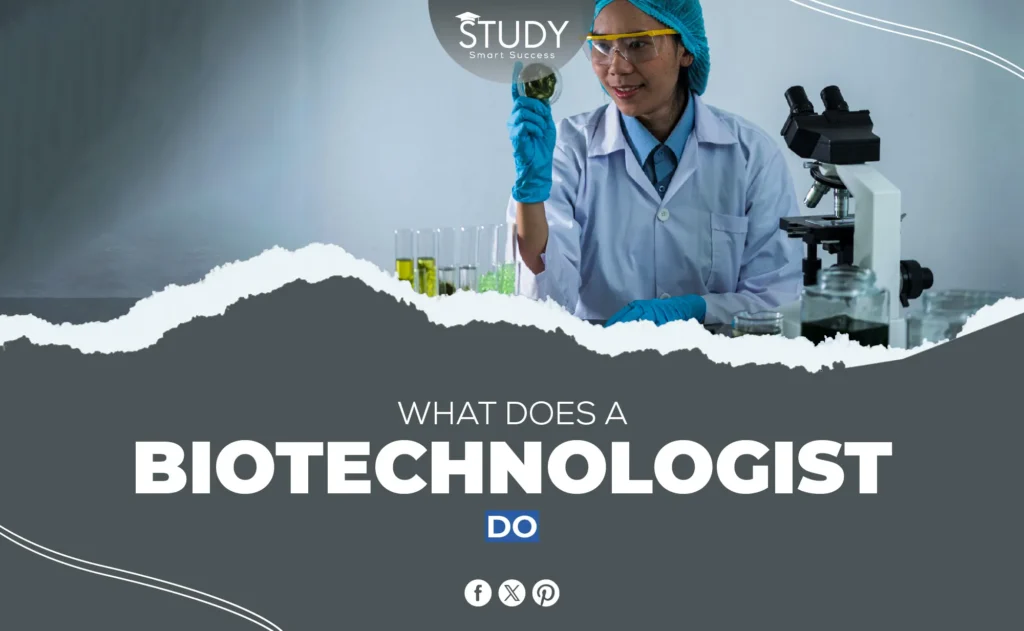Introduction
Biotechnology combines biology and technology to create new goods and processes that improve life and the environment. What does a biotechnologist do? Biotechnologists translate scientific discoveries into healthcare, agriculture, and environmental research applications. They manipulate organisms at the molecular level to produce novel medications, crop resistance, or sustainable biofuels.
Read more about what a neurobiologist is.
Educational Background of a Biotechnologist
A bachelor’s degree in biotechnology, molecular biology, genetics, or biochemistry is usually required for a biotechnology profession. The field one pursues frequently requires specialized understanding, and pharmaceutical biotechnologists may need more knowledge of chemistry and pharmacology.
A biotechnologist needs hard and soft skills to do well in this area. These are some of the hard skills:
- Technical Laboratory Skills: Knowledge of DNA extraction, purification, sequencing, and cell culture, including growing different cell lines. Knowledge of CRISPR gene editing, including guide RNA design and genome alterations, and PCR for DNA amplification.
- Critical Thinking and Problem-Solving: Biotechnologists must identify experiment or data analysis issues, create testable hypotheses, and plan well-structured studies to solve them. Examples include critically assessing outcomes, fixing errors, and enhancing methods for accuracy and efficiency.
- Bioinformatics Skills: Ability to organize and analyze substantial biological data sets utilizing data analytics and computational tools like R, Python, and bioinformatics software. Biotechnology research and development increasingly need genomic, proteomic, and transcriptomic interpretation.
A master’s or Ph.D. degree is often needed for higher-level jobs. These programs allow you to specialize in genetic engineering, bioprocessing, or environmental biotechnology and conduct cutting-edge studies.
Responsibilities of a Biotechnologist
Biotechnologists have many jobs that rely on their industry and area of expertise. On the other hand, some of their primary duties are:
- Research and Development: Biotechnologists are at the cutting edge of scientific progress because they experiment to determine how biological systems work. They might work in the pharmaceutical business to find new antibiotics or vaccines. In agriculture, they might investigate drought-resistant crops or ways to grow more crops from the same amount of land.
- Experimentation and Data Analysis: This includes planning controlled trials, gathering data, and using statistical analysis to interpret the results. Biotechnologists perform these tests using high-tech equipment such as spectrophotometers, electron microscopes, and bioinformatics software.
- Product Development: Once a good discovery has been made, biotechnologists often help move a process from the lab to mass production. This could mean improving a bioprocess so that many medicinal proteins can be made or making biofuels that don’t harm the environment.
- Quality Control and Assurance: Biotechnologists are essential to product quality and regulatory compliance. This requires thorough production process testing and monitoring to assure uniformity, efficacy, and safety. To ensure quality, they must rigorously document operations, assess data, and report discrepancies during manufacturing.
- Collaboration and Communication: Multidisciplinary teams require biotechnologists to collaborate and communicate well. Scientists must communicate complex concepts to colleagues, stakeholders, and regulators. They may work alongside engineers, IT specialists, and business managers to develop products and bring innovations to market.
Industries Where Biotechnologists Work
Biotechnology has many uses in many different fields. These are some of the most important fields where biotechnologists work:
- Healthcare and Pharmaceuticals: Biotechnologists play a significant role in the pharmaceutical industry, finding new drugs, developing gene therapy, and making testing tools. They work on ways to treat cancer, diabetes, and infectious diseases, among other things. Their work can lead to new medicines and vaccines, like creating COVID-19 vaccines based on mRNA.
- Agriculture: Agricultural biotechnologists try to make crops more resistant to damage, create genetically modified organisms (GMOs), and find the best ways to farm so that there is enough food for everyone. This includes creating crops resistant to diseases and pests that can grow because they aren’t as rich in nutrients, making them more productive and long-lasting.
- Environmental Science: Biotechnologists who work in ecological biotechnology devise ways to clean up waste (bioremediation), make biofuels, and find environmentally friendly ways to run businesses. They might work on things like using microorganisms to break down dangerous trash or developing long-term alternatives to fossil fuels.
- Food and Beverage: Biotechnologists in the food and beverage sector use bioprocessing to improve flavor, nutrition, and shelf life. They may design probiotic-rich foods, brew or bake fermentation techniques, and perform microbial testing for food safety. By controlling enzymes and microbes; they generate superior food additives and preservatives without compromising health.
- Industrial Biotechnology: Biotechnologists develop environmentally friendly and efficient industrial processes. Renewable resources are used to make bio-based chemicals, polymers, and materials. They also pioneer enzyme manufacturing for detergents, textiles, and biofuels to replace chemical processes with greener ones. In this field, biotechnologists help create a bio-economy with biological materials and methods.
Day-to-Day Activities of a Biotechnologist
Biotechnologists’ daily schedules can be very different depending on what they do, but here are some everyday things they do:
Conducting Laboratory Experiments
Biotechnologists spend much time in controlled labs testing and experimenting with biological samples. This may involve altering genes using CRISPR, studying complicated protein structures with mass spectrometers, or testing new medications and agricultural goods for efficacy and safety. We need their efforts to advance biological systems research and create new health, agriculture, and industry solutions.
Collaborating with Other Scientists
Biotechnologists often collaborate with biochemists, pharmacologists, geneticists, and engineers to achieve scientific and industrial goals. These collaborations bring various knowledge and viewpoints, making them crucial throughout product development. Teamwork boosts innovation and efficiency in biotechnological product and process development, from pharmaceuticals to biofuels.
Regulatory Compliance and Ethical Standards
Since biotechnology often involves genetic editing or testing new medicinal therapies, biotechnologists must traverse strict restrictions and ethical considerations. All laboratory experiments must follow safety and ethical requirements, acquire FDA or EMA approvals, and be transparent throughout the study process. Genetic privacy, ecological impact, and biotechnological long-term impacts must be considered in their work.
Documentation and Reporting
Biotechnologists must thoroughly document all their studies and findings. Detailed records of experimental techniques, observations, data analysis, and conclusions are required. Biotechnologists generate extensive reports for stakeholders, clients, or conferences or publish them in peer-reviewed scientific journals to advance the area. Accurate documentation is vital for reproducibility, scientific advancement, and financing.
Career Path and Advancement
The path a biotechnologist takes in their career depends on what they study, how much experience they have, and the business they work in. Before becoming biotechnologists, most people start their jobs as research assistants or lab technicians. These jobs allow you to get real-world practice in a lab and improve your technical skills.
- Career Advancement: Biotechnologists need more experience and new skills to become senior research scientists, project managers, or department heads. People who get their PhD can go on to teach or lead study teams, helping to shape the next generation of biotechnologists.
- Continuous Learning: Biotechnology changes quickly, so people who work in it must keep up with new tools and developments. Biotechnologists can improve their job chances by getting certified in specialized skills like bioinformatics or CRISPR gene editing.
Future Prospects: Progress in genomics, personalized medicine, and environmental protection is expected to drive growth in the biotechnology business. Biotechnologists will be very important in dealing with world problems like disease outbreaks, climate change, and food security.
Conclusion
Biotechnologists are at the forefront of new scientific discoveries. They are essential in improving healthcare, farming, and protecting the environment. We use their work in many parts of our daily lives, like the medicines we take, the food we eat, and the surroundings we try to keep safe. Biotechnology is a field where people interested in science and technology can make a real difference.


